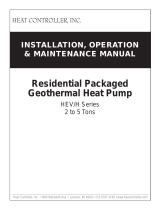
1 Service
Service Manual
18
Viewable and changeable control parameters
A: Initial Setup
Clock and Date
The control uses an internal clock for the night setback
feature and for logging of events. For these features to
work correctly, the clock must be set when the boiler is first
installed or anytime the boiler has been powered off for more
than four (4) hours. This parameter must be accessed to set
the clock. Parameter A2 sets the date.
Parameters A3 - A12 shown in the Initial Setup Menu are
grouped here for convenience. For a detailed explanation
of each parameter, reference the specific menu for each
parameter.
B: Set Points
Space Heating (SH) Minimum Set Point
The SH minimum set point sets the minimum water
temperature set point that can be used for space heating
operation. The user or installer will not be able to program
the control with a lower SH set point. This parameter can
only be changed by the installer by accessing parameter B1.
Space Heating (SH) Maximum Set Point
The SH maximum set point sets the maximum water
temperature set point that can be used for space heating. The
user or installer will not be able to program the control with
a higher SH set point. This parameter can only be changed
by the installer by accessing parameter B2.
Space Heating (SH) Set Point
The SH set point sets the water temperature set point used
during space heating calls. This parameter can be changed by
the installer by accessing parameter B3.
SH Offset
The SH offset sets how many degrees above set point the
temperature can go before the boiler will shut off. This
parameter can only be changed by the installer by accessing
parameter B4.
SH Differential
The SH differential sets how many degrees below the offset the
temperature has to drop before the boiler turns back on. This
parameter can only be changed by the installer by accessing
parameter B5.
HWG Tank Set Point
By installing a tank sensor, the SMART TOUCH control can
perform the tank thermostat function. The SMART TOUCH
control automatically detects the presence of this sensor, and
generates a call for heat when the tank temperature drops below
the tank set point minus the differential (parameter B7), and
finishes the call for heat when the tank temperature reaches
tank set point. This parameter can be changed by the installer
by accessing parameter B6.
HWG Tank Differential
When a tank sensor is installed, the tank temperature must drop
this amount below the tank set point (parameter B6) before
the boiler will turn on. The installer can adjust this setting by
accessing the parameter B7.
Manual Reset High Limit
The SMART TOUCH control contains an integral Manual
Reset High Limit (MRHL) on the outlet of the heat exchanger.
Once the outlet temperature exceeds the MRHL set point, the
boiler will shut down and lock out. Once the outlet temperature
has dropped below this set point, the RESET button on the LCD
display must be pressed to clear this lockout. This set point can
be adjusted by accessing parameter B8.
Auto Reset High Limit
The SMART TOUCH control contains an integral Auto Reset
High Limit (ARHL) on the outlet of the heat exchanger. Once
the outlet temperature exceeds the ARHL set point, the boiler
will shut down and lock out. Once the outlet temperature has
dropped below this set point, the RESET button on the LCD
display can be pressed to reset this lockout. If RESET is not
pressed, the control will automatically reset the lockout after
five (5) minutes. This set point can be adjusted by accessing
parameter B9.
CAUTION
Before changing parameters, note the
settings so that the unit can be returned to
its original operating parameters.
NOTICE
The internal clock does not adjust for
Daylight Savings Time and therefore,
will require a manual adjustment.





















